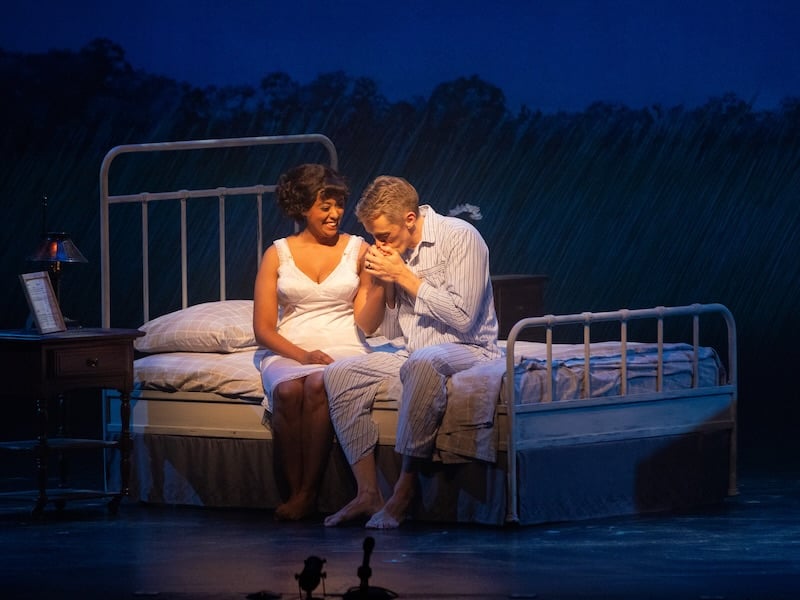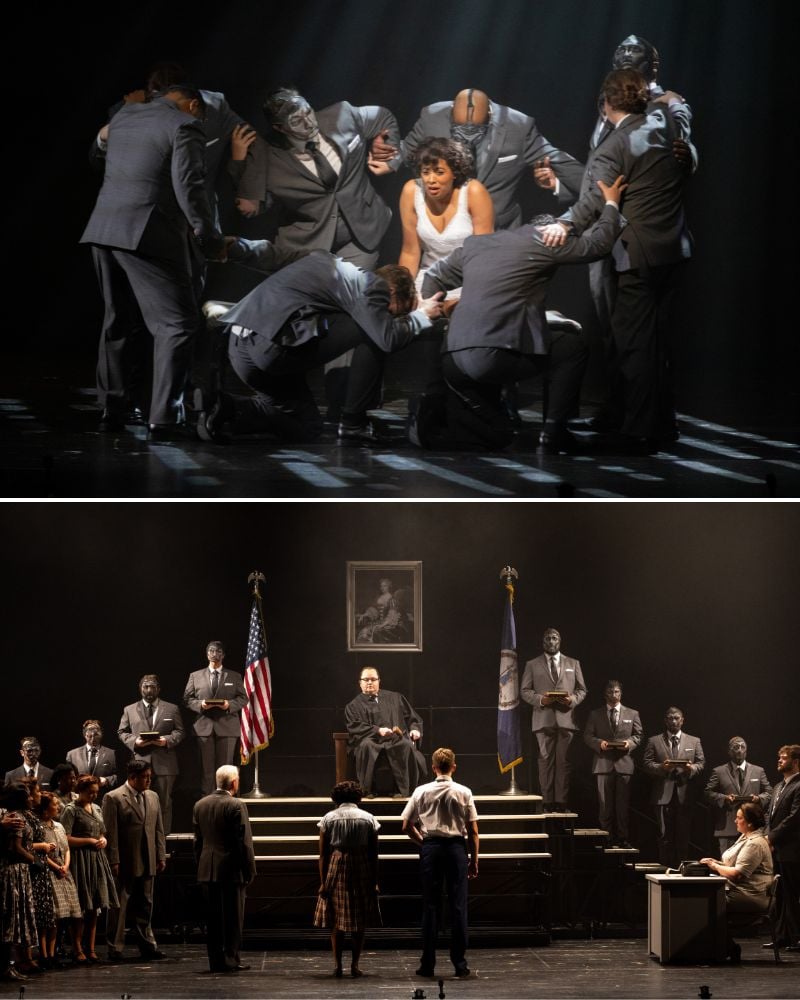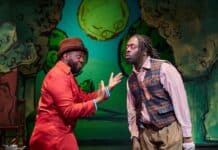“Loving versus Virginia. So beautiful, it’s a song.” So sings ACLU lawyer Bernard Cohen (Troy Cook) when he first hears of a case challenging Virginia’s statutory prohibition of interracial marriage. Virginia Opera’s world premiere of Loving v. Virginia, by Damien Geter (music) and Jessica Murphy Moo (libretto), celebrates the love of a white man, Richard Loving (Jonathan Michie), and a Negro woman, Mildred Jeter Loving (Flora Hawk), and their fight to live their married life free from legal interference.
In 1958, Virginia was not for these lovers. Virginia law said both that an interracial marriage was void and that a couple who left the state to get married and returned to Virginia committed a felony. Having married in Washington, DC, and returned to their home in Caroline County, Virginia, the Lovings placed themselves in legal jeopardy. In a harrowing scene — one with all too much contemporary resonance — the police break into the couple’s bedroom at 2 a.m. and cart them off to jail. The court then banished them from the state, and their home, for 25 years.

The writers had the task of intertwining the deeply personal stories of Richard and Mildred and their families and the legal process that led to the landmark 1967 Supreme Court decision bearing their name. They, and director Denyce Graves-Montgomery, chose an interesting staging device to help tell the legal story. A “law chorus” of several identically clad ensemble members symbolized the impersonal demands of the legal system, most effectively when the group, with undulating movements, surrounds Mildred when she is jailed for the crime of living with her husband. Geter’s scoring for the law chorus, and for the scenes in which the Lovings are brought into the local court, emphasizes rat-a-tat Morse code–like motifs, punctuated by loud gavel bangs.
In contrast, the music for Richard and Mildred is far more lyrical, focusing on their love for each other and their longing to be home in their own place. Michie and Hawk sang strongly and beautifully while exploring their characters’ responses to the joys and difficulties of their lives. Richard is the picture of a man deeply rooted in the traditional role of protecting and providing for his family. Geter’s music, and Michie’s performance of it, paint a searing picture of Richard’s frustration at his powerlessness to do so. The music makes articulate the feelings of someone who is explicitly a man of few words.
Whether despairing while imprisoned, finding her own voice while writing to the Attorney General and the ACLU, or in loving her husband and children, Hawk just as effectively portrays her character as a woman who, above all, wants to be home with her family. Neither she nor Richard set out to be an activist or civil rights pioneer. Their perseverance made them the instrument of a major positive change in American law.

ACLU lawyer Philip Hirschkop (Christian Sanders) and his co-counsel Bernard Cohen show the passion and intellectual rigor — and even the sense of fun — of appellate advocates for their cause, while not neglecting to care for their clients who must endure years of the glacial pace of the legal system. The rather truncated capsule of their arguments before the Supreme Court is written in the fashion of high drama, perhaps inevitable in an operatic treatment of what, in reality, had a much more conversational tone before a clearly supportive court. (An audio recording of the argument is available online.) In a grace note for Saturday’s performance, Hirschkop, who will turn 89 next week, was in attendance.
The opera features a number of well-conceived and well-sung supporting roles, including Melody Wilson and Phillip Bullock as Mildred’s parents, Alissa Anderson as Richard’s mother, and Benjamin Werley as a racist sheriff and judge. This is a strong chorus show, and the large ensemble is very effective whether as the Lovings’ Caroline County community, a regimented set of clerks granting or refusing marriage licenses, or Richard’s fellow bricklayers on a project in DC during the couple’s exile there. The Richmond Symphony, under the direction of Adam Turner, was excellent in its playing of the highly varied requirements of Geter’s score.
Virginia Opera performs in Norfolk, Fairfax, and Richmond in consecutive weekends, which limits what designers can do with sets. For Loving, Mikiko Suzuki MacAdams used backdrops depicting a bucolic field in Caroline County and a street in downtown DC, groups of risers that represented a motor race grandstand and courthouse scenes, and a variety of small set pieces wheeled or pushed on and off stage (e.g., for the Lovings’ home or the ACLU office). This resulted in some laborious scene changes that slowed the production’s pace on a few occasions. Aside from the gray suits and masks of the law chorus, costume designer Jessica Jahn effectively dressed the cast in realistic period outfits.
The Supreme Court decision that freed the Lovings to return home was unanimous. The legal issues involved are far from over, however. In a thoroughly researched 2014 Boston College Law Review article, Christopher R. Leslie argued that Justice Samuel Alito’s dissent in a key 2013 gay marriage case, Windsor v. United States, effectively embraced the arguments made by Virginia in the Loving case. Had Alito been a member of the Court in 1967, Leslie persuasively contended, he could not — consistent with the views he expressed in Windsor — have joined the Court’s decision.
By showing what legal constraints on the lives and families of disfavored minorities mean in human terms, through the emotionally compelling medium of opera, the creators and performers of Loving v. Virginia not only delivered a touching love story and a powerful history lesson but also offered a cautionary note about the continuing presence of societal bias and legal thinking that would deprive loving couples of their ability to make a peaceful home together.
Running Time: Approximately two and a half hours, including one intermission.
Loving v. Virginia played on May 3 and 4, 2025, presented by Virginia Opera and Richmond Symphony performing at the Center for the Arts at George Mason University, 4373 Mason Pond Dr, Fairfax, VA.
The program for Loving v. Virginia is online here.
Loving v. Virginia
Music by Damien Geter
Libretto by Jessica Murphy Moo
Directed by Denyce Graves-Montgomery
Commissioned by Virginia Opera and Richmond Symphony
In partnership with the Institute of Contemporary Art at Virginia Commonwealth University
Co-produced by Virginia Opera and Minnesota Opera



